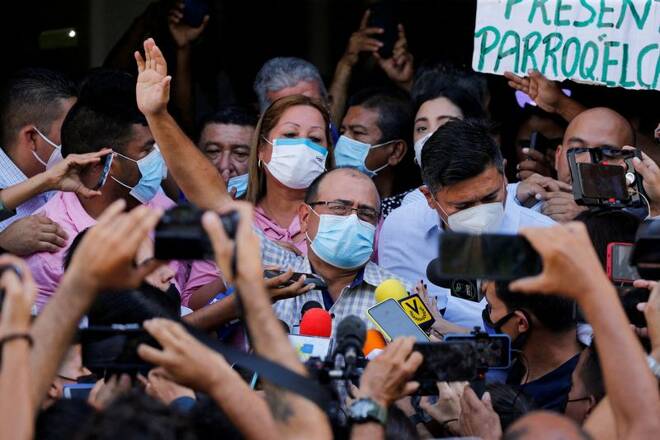Advertisement
Advertisement
Analysis-Venezuela opposition gains hope from win in ruling party stronghold
By:
By Deisy Buitrago and Mayela Armas BARINAS, Venezuela/CARACAS (Reuters) - A big win for Venezuela's fractured opposition in a stronghold of the ruling socialist party on Sunday has given it fresh hope that electoral triumphs are within its grasp if it can both unite and mobilize voters.
By Deisy Buitrago and Mayela Armas
BARINAS, Venezuela/CARACAS (Reuters) – A big win for Venezuela’s fractured opposition in a stronghold of the ruling socialist party on Sunday has given it fresh hope that electoral triumphs are within its grasp if it can both unite and mobilize voters.
Sergio Garrido, an opposition leader, scored a surprise win in a rerun of gubernatorial elections in Barinas state – the birthplace of Venezuela’s former socialist leader Hugo Chavez – with a strong 55% showing, defeating former vice president and foreign minister Jorge Arreaza, who managed a distant 41.2%.
The total number of registered voters in Barinas, a state with about a million inhabitants, surged to 311,595 on Sunday from 278,666 in November, an uptick attributed mainly to grass roots organization by the opposition.
The vote marks the first time Venezuela’s ruling Socialist party has yielded power to an opposition candidate in Barinas and is a sign of erosion in its support and rising abstention among its usual electorate, analysts said.
The opposition victory won praise from the United States, which has struggled to get much traction against President Nicolas Maduro since declaring his 2018 re-election to be fraudulent.
“Disqualifications of opposition candidates, media censorship, voter intimidation, & other authoritarian tactics could not subvert the will of Venezuelan voters,” tweeted Brian Nichols, the U.S. State Department’s assistant secretary for Western Hemisphere affairs.
While the result leaves the ruling party in control of most governorships, it represents a symbolic victory for the opposition, which now controls four of the country’s 23 governorships, the same number as in 2017.
To have any chance of replicating Sunday’s victory more widely, the opposition must refocus itself on winning power at the ballot box after years of boycotts, unify its leadership across the country and prepare for an upcoming presidential election in 2024, seen as a way out of Venezuela’s long political impasse, analysts said.
“When a region is upset, it finds a way to channel that discomfort,” said Jhon Magdaleno, a political scientist and director of the local consultancy Polity. “Barinas was an example of rebuilding (by the opposition). Garrido ended up being backed by multiple political parties.”
Disillusionment
Many Venezuelans have grown disillusioned with politics amid a long economic recession and hyperinflation in the country, a member of the Organization of Petroleum Exporting Countries (OPEC). At least five million citizens have emigrated because of the crisis.
The opposition’s strategy has experienced ups and downs in recent years. It refused to participate in Venezuela’s 2018 presidential and 2020 parliamentary elections, arguing that a fair vote was impossible because of interference from Maduro.
But in 2021, after U.S. sanctions made no headway in securing Maduro’s ouster, opposition parties opted to roll the dice on the ballot box.
After a weak showing in November regional elections in which the ruling socialists won 19 of 23 states in play, the opposition said it would aim to rebuild, and its leader Juan Guaido on Monday said he would prioritize unity.
“We have to do what we have done well in the past: organize, mobilize and send clear messages to citizens,” Guaido told reporters in Caracas.
The Barinas vote was repeated under Supreme Court orders after it disqualified the initial opposition candidate following an order by the country’s comptroller general saying he was under investigation and was disqualified from running.
“This situation must serve to face the upcoming challenge: to reunify and strengthen the democratic alternative,” Guaido said, adding that the opposition would aim to reach a consensus on whether to seek a recall vote against Maduro.
Speaking after his swearing-in as governor, Garrido said Venezuelans had realized that if Barinas had managed to vote out the socialists: “Why would the rest of the people of Venezuela not be able to?”
The loss of the governorship is also a sign of internal tensions in the ruling party and raises questions about the performance of regional leaders linked to the party, analysts said.
“There are areas that the ‘Chavismo’ has been losing, and the party knows it, so since 2015 it has applied the strategy of staying in power as a minority,” said Félix Seijas, director of the Delphos consultancy.
(Reporting by Deisy Buitrago in Barinas; Vivian Sequera and Mayela Armas in Caracas; editing by Richard Pullin)
About the Author
Reuterscontributor
Reuters, the news and media division of Thomson Reuters, is the world’s largest international multimedia news provider reaching more than one billion people every day. Reuters provides trusted business, financial, national, and international news to professionals via Thomson Reuters desktops, the world's media organizations, and directly to consumers at Reuters.com and via Reuters TV. Learn more about Thomson Reuters products:
Did you find this article useful?
Latest news and analysis
Advertisement
